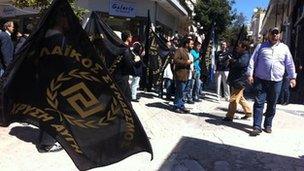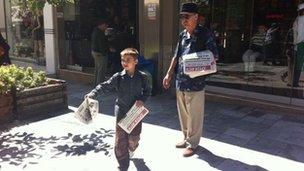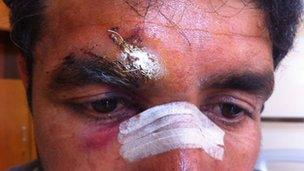Greece's far right hopes for new dawn
- Published

Golden Dawn is looking to take advantage of Greeks' disillusionment of mainstream parties
The boxes are packed with warm clothes, the plastic bags full of long-life food. There is even a teddy bear in tow. All sit piled in a rickety blue van, winding its way through Athens to be delivered to the Greek capital's needy.
Behind the aid is not a humanitarian organisation but Greece's ultranationalist party, Chrysi Avgi - or Golden Dawn. Their critics call them violent extremists. But they are keen to show off their soft side - and it wins votes.
One of the recipients is 76-year-old Katerina Karousi. She breaks down in tears as she talks of battling with cancer.
"Why not vote for Golden Dawn?" she asks. "They're helping us, so I should give them something in return."
But beyond the benevolent facade is a party that strikes fear into many here. With a virulent anti-immigrant line, Golden Dawn are often labelled neo-Nazis.
The leader was filmed making a Hitler salute in a town council meeting and the party logo has been likened to a swastika, though officials maintain it is the ancient Greek meander symbol.
Despite it all, Greeks are flocking to Golden Dawn, spurred by financial angst and deep disillusionment with mainstream politicians. The party scored just 0.29% of the vote in the last election in 2009.
Now polls give them over 5% - enough to enter parliament for the first time. A shock for a country that emerged from a right-wing military dictatorship less than four decades ago.
Back in the van, I quiz party volunteers Athina and Rosalie about their views and particularly the frequent allegations that Golden Dawn members assault immigrants on the streets; something the party officially denies.

Party members are campaigning hard ahead of Sunday's vote
"We believe in our race, we believe in our nation's power," Athina says. "These immigrants have not been checked for diseases. If a Greek person feels threatened by an immigrant, I justify someone trying to give them justice.
"I don't know why I should care about violence against immigrants."
"We are not racist," Rosalie assures me. "They [immigrants] are [racist] towards us, because we love our country. Is this wrong?
"We brought civilisation, we brought everything. They kill us and they rape us."
'Mines on our borders'
The next morning, the party campaigns in the affluent Athens suburb of Marousi. It is striking to see how many people take the fliers and newspapers as they are handed out, the party's growing popularity clearly visible.
But as we enter the local market, a passer-by throws an orange at them. Suddenly, Golden Dawn members turn on who they suspect is the assailant, screaming insults and threatening to attack him.
Further on, we reach the main square, where they spot a Socialist MP, Petros Efthymiou. They round on him, pelting him with jugs of water and cups of coffee.
It is behaviour giving fuel to those who call the party pure thugs.
"This is the face of fascism," Mr Efthymiou tells me. "Just brutal violence. And no respect for democratic values. But this is a problem not only for Greece but for all of Europe."
The far right is indeed on the rise beyond Greece's borders.
Marine Le Pen, leader of the National Front in France, achieved her party's highest ever share of the vote in the first round of the French presidential election in April.
Other countries, including the Netherlands and Denmark, have seen an increase in far right support; political extremes benefiting from the financial hardship.
"Greece is dying from immigrants, politicians like the guy you just saw and bankers," says Ilias Panagiotaros, Golden Dawn's spokesman.
"We're going to put mines on our borders and we're going to have electric fences."
So immigrants should be killed by landmines, I ask?
"I don't care, they shouldn't jump into the country - that's their problem," he replies.
I ask about the neo-Nazi label.
"They can say what they like, it's not true," he says. We're Greek nationalists and we're proud of it."
Scapegoats
That rhetoric has struck a chord here, feeding into a wider anti-immigrant narrative before the election. With more than 80% of migrants to the EU now passing through Greece, they are an easy target for a nation sinking deeper into recession.
The current government has announced the creation of up to 30 detention centres for illegal immigrants, the first of which has now opened.

Altaf - not his real name - says the increase in racist violence has left him scared to go out
And the leader of the centre-right New Democracy Party, Antonis Samaras - who heads the polls - has made clamping down on illegal immigration one of his key electoral themes.
Meanwhile, anti-immigrant violence has risen steadily. In an Athens hospital I meet Altaf - not his real name - a Pakistani immigrant badly beaten in the past few days. He does not know who his attackers were.
His arm and nose are broken, he has a thick gash on his skull and a cut above his eyebrow.
"I don't understand why this is happening," he says.
"We're all human. I'm scared to go out now. It never used to be this way."
The other side shouts loudly too - anti-racism rallies have been held by those determined to stop Golden Dawn at any cost. But their efforts may well be futile.
A divided and deeply angry nation is going to the polls, desperate for an alternative - a nation fearing the future and looking for someone to blame.
- Published30 April 2012
- Published29 April 2012
- Published17 February 2012